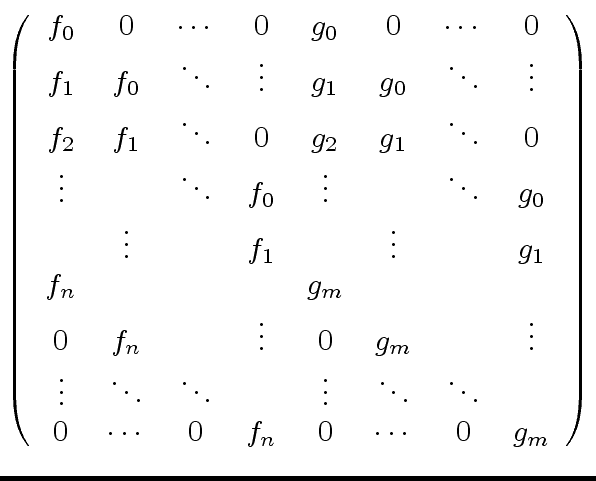Next: Lucky and unlucky modular reductions Up: Advanced Computer Algebra: The resultant Previous: Relation between gcds in and
 over a field the following
lemma says that it is possible to find polynomials
over a field the following
lemma says that it is possible to find polynomials  ,
,
 ,
,
 if and only if
if and only if
 .
.
![$ f, g \in {\bf k}[x]$](img120.png) be nonzero polynomials
over the field k.
Then the following statements are equivalent.
be nonzero polynomials
over the field k.
Then the following statements are equivalent.

![$ s, t \in R[x] \setminus \{ 0 \}$](img121.png) such that
such that
 |
(24) |
 .
If
.
If  then
then
 and a solution is
and a solution is
 |
(25) |
 be a solution.
Assume that
be a solution.
Assume that  would imply
would imply  .
This is impossible since
.
This is impossible since  and
and
 .
Hence
.
Hence  holds.
holds.
![$ f, g \in {\bf k}[x]$](img120.png) nonzero polynomials of degrees
nonzero polynomials of degrees  respectively
we consider the map
respectively
we consider the map
![$\displaystyle {\phi}: \ \left. \begin{array}{lll} {\bf k}[x] \times {\bf k}[x] ...
...ightarrow & {\bf k}[x] \\ (s,t) & \longmapsto & s f + tg \\ \end{array} \right.$](img132.png) |
(26) |
 we define
we define
![$\displaystyle P_d \ = \ \{ p \in {\bf k}[x] \ \mid \ {\deg}(p) < d \}$](img134.png) |
(27) |
 |
(28) |
 is a linear map
is a linear map
![$ f, g \in {\bf k}[x]$](img120.png) nonzero polynomials of degrees
nonzero polynomials of degrees  such that
such that  .
Then we have:
.
Then we have:
 is an isomorphism.
is an isomorphism.
 then the Bézout coefficients
then the Bézout coefficients  computed by the Extended Euclidean Algorithm
form the unique solution in
computed by the Extended Euclidean Algorithm
form the unique solution in
 of the equation
of the equation
 |
(29) |
 iff
iff
 .
Since both
.
Since both
 and
and  have dimension
have dimension  this proves the first claim.
The second claim is a consequence of the first one.
this proves the first claim.
The second claim is a consequence of the first one.
 nonzero univariate polynomials in
nonzero univariate polynomials in  such that
such that  .
However let us relax the hypothesis on the coefficient ring
by assuming that it is just a commutative ring
.
However let us relax the hypothesis on the coefficient ring
by assuming that it is just a commutative ring  |
(30) |
 consists
of the
consists
of the  for
for
 followed by
the
followed by
the  for
for
 .
On this basis
.
On this basis  |
(31) |
 is denoted
is denoted
 and called
the Sylvester matrix of
and called
the Sylvester matrix of  .
We make the following conventions.
.
We make the following conventions.
 .
.
 or
or
![$ f \in R[x] \setminus R$](img159.png) then
then
 .
.
 then
then
 .
.
![$ f, g \in {\bf k}[x]$](img120.png) be nonzero univariate polynomials
over a field
be nonzero univariate polynomials
over a field  .
.
 .
.
![$ s,t \in {\bf k}[x] \setminus \{ 0 \}$](img164.png) such that
such that
 |
(32) |
![$ f,g \in R[x]$](img76.png) be nonzero univariate polynomials
over an integral domain
be nonzero univariate polynomials
over an integral domain ![$ s, t \in R[x]$](img167.png) such that
such that
 |
(34) |
 then we know that there exist
then we know that there exist
![$ s,t \in {\bf k}[x] \setminus \{ 0 \}$](img164.png) such that
such that
 |
(35) |
If
 then
then ![]() and
and ![]() are coprime
in
are coprime
in
![$ {\bf k}[x]$](img170.png) .
Then there exists
.
Then there exists
![$ u,v \in {\bf k}[x]$](img171.png) with stated degree bounds
such that
with stated degree bounds
such that
 holds in
holds in
![$ {\bf k}[x]$](img170.png) .
Observe that
.
Observe that
 are in fact the unique
solution of a linear system whose matrix is the
Sylvester
are in fact the unique
solution of a linear system whose matrix is the
Sylvester
 matrix of
matrix of  by
by
 .
.
 and
and
 have coefficients in
have coefficients in Marc Moreno Maza